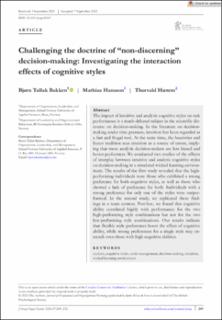| dc.contributor.author | Bakken, Bjørn Tallak | |
| dc.contributor.author | Hansson, Mathias | |
| dc.contributor.author | Hærem, Thorvald | |
| dc.date.accessioned | 2024-03-20T08:16:18Z | |
| dc.date.available | 2024-03-20T08:16:18Z | |
| dc.date.created | 2023-10-05T08:38:26Z | |
| dc.date.issued | 2023 | |
| dc.identifier.citation | Journal of Occupational and Organizational Psychology. 2023, 97 (1), 1-24. | en_US |
| dc.identifier.issn | 0963-1798 | |
| dc.identifier.uri | https://hdl.handle.net/11250/3123262 | |
| dc.description.abstract | The impact of intuitive and analytic cognitive styles on task performance is a much-debated subject in the scientific discourse on decision-making. In the literature on decision-making under time pressure, intuition has been regarded as a fast and frugal tool. At the same time, the heuristics and biases tradition sees intuition as a source of errors, implying that more analytic decision-makers are less biased and better performers. We conducted two studies of the effects of interplay between intuitive and analytic cognitive styles on decision-making in a simulated wicked learning environment. The results of the first study revealed that the high-performing individuals were those who exhibited a strong preference for both cognitive styles, as well as those who showed a lack of preference for both. Individuals with a strong preference for only one of the styles were outperformed. In the second study, we replicated these findings in a team context. Post-hoc, we found that cognitive ability correlated highly with performance for the two high-performing style combinations but not for the two low-performing style combinations. Our results indicate that flexible style preferences boost the effect of cognitive ability, while strong preferences for a single style may entrench even those with high cognitive abilities. | en_US |
| dc.language.iso | eng | en_US |
| dc.rights | Navngivelse 4.0 Internasjonal | * |
| dc.rights.uri | http://creativecommons.org/licenses/by/4.0/deed.no | * |
| dc.subject | analysis | en_US |
| dc.subject | cognitive styles | en_US |
| dc.subject | crisis management | en_US |
| dc.subject | decision-making | en_US |
| dc.subject | intuition | en_US |
| dc.subject | wicked learning environment | en_US |
| dc.title | Challenging the doctrine of “non-discerning” decision-making: Investigating the interaction effects of cognitive styles | en_US |
| dc.title.alternative | Challenging the doctrine of “non-discerning” decision-making: Investigating the interaction effects of cognitive styles | en_US |
| dc.type | Peer reviewed | en_US |
| dc.type | Journal article | en_US |
| dc.description.version | publishedVersion | en_US |
| dc.rights.holder | © 2023 The Authors | en_US |
| dc.subject.nsi | VDP::Samfunnsvitenskap: 200 | en_US |
| dc.source.pagenumber | 1-24 | en_US |
| dc.source.volume | 97 | en_US |
| dc.source.journal | Journal of Occupational and Organizational Psychology | en_US |
| dc.source.issue | 1 | en_US |
| dc.identifier.doi | 10.1111/joop.12467 | |
| dc.identifier.cristin | 2181855 | |
| cristin.ispublished | true | |
| cristin.fulltext | original | |
| cristin.qualitycode | 2 | |

